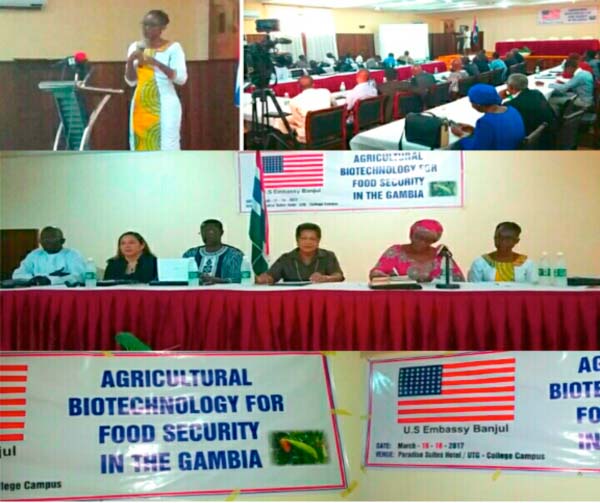
The
two-day workshop held at the Paradise Suite Hotel and UTG Brikama Campus was
jointly sponsored by the US Embassy Banjul and agricultural stakeholders like
the National Agriculture Research Institute (NARI), the National Environment
Agency (NEA), the Food and Agriculture Organization (FAO), the World Food
Programme and the United Nations Development Programme (UNDP).
The
US Embassy Banjul continues to build a strong relationship with the Gambia
government and with development partners, in the struggle to combat food
insecurity and malnutrition in The Gambia.
The
US ambassador to The Gambia, Carolyn Patricia Alsup, speaking at the end of the
training course, said biotechnology is an integral part of US agricultural
production, and they partner with countries around the world to fund both
research collaboration and regulatory framework development aimed at improving
agricultural production, as well as improve food security and nutrition around
the globe.
According
to Alsup, biotechnology has been proven to be an effective tool in agricultural
systems worldwide, because the technology holds much potential in the
alleviation of food insecurity, enhancing food safety and addressing climate
change.
Alsup
expressed gratitude to Ms. Aneth David Mwakalili, the expert speaker, for
contributing her valuable time to come all the way from his home country to
deliver the lectures.
The
representative of the ministry of Agriculture, Adama Ngom Njie, said improving
farmers’ access to technology is central to meeting the double challenge of
closing the development deficit and adapting to climate change.
According
to Njie, modern biotechnology research, together with appropriate policies,
better infrastructure and traditional research methods have the potential to
bring benefits to millions of poor farmers and consumers.
She
urged them to be actively involved in the workshop, so that together they could
lay the foundation for a definitive treatment of their concerns related to
increase food production, and reduce agricultural vulnerability to the impact
of pests, viruses and climate change.
She
reiterated the Gambia’s government’s appreciation and gratitude to Ambassador
Alsup and all the stakeholders in the country - UNDP, WFP, FAO, NEA, among
others, for their unflinching support.
Biotechnology
increases productivity per units of farmland, reduces malnutrition, improves
food quality and safety of some GM crops.


